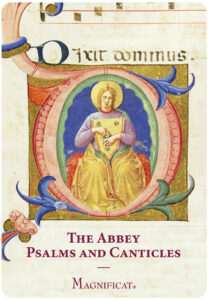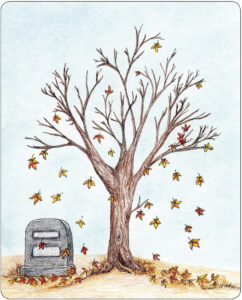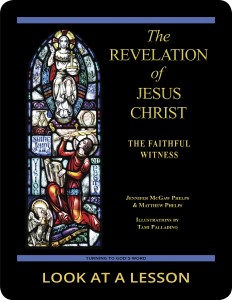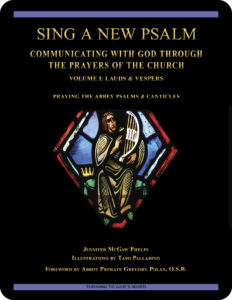Sing a New Psalm:
Communicating with God Through
the Prayers of the Church
Volume I: Lauds & Vespers
Lesson 22 Teach Us to Number Our Days
Psalm 90, Psalm 98, and Psalm 99
Wednesday Lauds (Week II)
Revised Standard Version Catholic Edition (RSVCE)*
New American Bible Revised Edition (NABRE)*
Catechism of the Catholic Church
ex libris (in our library)
next lesson: O Give Thanks to the LORD
This material coordinates with Lesson 22 on pages 90–93 in Sing a New Psalm: Communicating with God Through the Prayers of the Church—Volume I: Lauds & Vespers. Our Catholic Bible study is based on The Abbey Psalms and Canticles, an English translation of the Psalms prepared by the monks at Conception Abbey in 2010 and first published as The Revised Grail Psalms. The Abbey Psalms and Canticles is a revision of that work, finished in 2020 and published by the United States Conference of Catholic Bishops (USCCB). Wording and numbering of some Psalms and verses in other translations may differ. This new translation of the Psalms in the process of being added to all English-language Liturgy of the Hours books used in the United States. The USCCB also plans a liturgical Bible based on the NABRE translation.
The Abbey Psalms and Canticles, an English translation of the Psalms prepared by the monks at Conception Abbey in 2010 and first published as The Revised Grail Psalms. The Abbey Psalms and Canticles is a revision of that work, finished in 2020 and published by the United States Conference of Catholic Bishops (USCCB). Wording and numbering of some Psalms and verses in other translations may differ. This new translation of the Psalms in the process of being added to all English-language Liturgy of the Hours books used in the United States. The USCCB also plans a liturgical Bible based on the NABRE translation.
“Unlike other prayers in sacred Scripture, the prayers contained in the Psalms are not inserted into a narrative story that specifies their meaning and function. Instead, the Psalms are given to the believer precisely as a text of prayer. Since they are the Word of God, the believer who prays the Psalms speaks to God using the very words that God himself has given to us. Thus, in praying the Psalms we learn to pray. The Psalms are a school of prayer.”—Pope Benedict XVI
welcome to our in-depth study of the Psalms
We invite groups and individuals to check out the sample first lesson from this 28- lesson Turning to
lesson Turning to  God’s Word Catholic Bible study. Our online study pages include additional questions, commentary, and prayers based on the Psalm texts. Sing a New Psalm: Communicating with God Through the Prayers of the Church—Volume I: Lauds & Vespers has been granted an imprimatur. A digital version of this study can be purchased from our website shop. Volume II: Vigils, Day Prayer & Compline is scheduled for publication in 2025. If you have a Bible-related question or comment, click on one of the “ask us your question” or “what do you think” buttons on any online study page.
God’s Word Catholic Bible study. Our online study pages include additional questions, commentary, and prayers based on the Psalm texts. Sing a New Psalm: Communicating with God Through the Prayers of the Church—Volume I: Lauds & Vespers has been granted an imprimatur. A digital version of this study can be purchased from our website shop. Volume II: Vigils, Day Prayer & Compline is scheduled for publication in 2025. If you have a Bible-related question or comment, click on one of the “ask us your question” or “what do you think” buttons on any online study page.
open with prayer
It’s always wise to begin any Bible study with prayer, whether reading the Scriptures alone or meeting with others in a discussion study group. You can pray using your own words, pray one of the Psalms in this lesson, or use one of the opening prayers on our website. We especially like the following:
Lord Jesus, you promised to send your Holy Spirit
to teach us all things.
As we read and study your word today,
allow it to touch our hearts and change our lives. Amen.
we must accept that our days really are numbered
For this lesson, Turning to God’s Word co-founder Tami Palladino has drawn a tombstone next to a tree shedding its leaves. In Psalm 90, the Psalmist reminds us that our time on earth is limited. No matter  what our situation, all men and women eventually experience physical death. There’s a wide variety of ways each of us approaches this certainty, but for Christians, our physical death is viewed as the moment when we enter eternity. What we do with our lives before that is of utmost importance. Our strongly held belief in the eternal nature of God and our hope for the eternal life promised by Jesus sustains us through worldly difficulties and motivates us to cling to our faith. What do you see as the most important thing that you’d like to accomplish during your remaining time on the earth? What can you do today to make the world a better place? Click on Tami’s illustration (right) to enlarge it. Her original illustration is on page 91 in Sing a New Psalm: Communicating with God Through the Prayers of the Church—Volume I: Lauds & Vespers.
what our situation, all men and women eventually experience physical death. There’s a wide variety of ways each of us approaches this certainty, but for Christians, our physical death is viewed as the moment when we enter eternity. What we do with our lives before that is of utmost importance. Our strongly held belief in the eternal nature of God and our hope for the eternal life promised by Jesus sustains us through worldly difficulties and motivates us to cling to our faith. What do you see as the most important thing that you’d like to accomplish during your remaining time on the earth? What can you do today to make the world a better place? Click on Tami’s illustration (right) to enlarge it. Her original illustration is on page 91 in Sing a New Psalm: Communicating with God Through the Prayers of the Church—Volume I: Lauds & Vespers.
holy—you could look it up in our archives
“Holy” on page 93 in Sing a New Psalm: Communicating with God Through the Prayers of the Church—Volume I: Lauds & Vespers  examines what it means that something is “holy.” To learn some related words that contribute to our understanding of holiness and the part that holiness plays in our Christian faith, read Lost in Translation, an online column in which Turning to God’s Word author Matthew Phelps helps readers connect with ideas expressed in the original languages of the Scriptures. New Lost in Translation entries are posted on Mondays, and past entries are archived on our website. Contact us if you’d like to receive Lost in Translation by email every week.
examines what it means that something is “holy.” To learn some related words that contribute to our understanding of holiness and the part that holiness plays in our Christian faith, read Lost in Translation, an online column in which Turning to God’s Word author Matthew Phelps helps readers connect with ideas expressed in the original languages of the Scriptures. New Lost in Translation entries are posted on Mondays, and past entries are archived on our website. Contact us if you’d like to receive Lost in Translation by email every week.
 the popes inspire us—a newer & better song
the popes inspire us—a newer & better song
“Sing a New Song” on page 92 in Sing a New Psalm: Communicating with God Through the Prayers of the Church—Volume I: Lauds & Vespers is an excerpt from a general audience with Pope St. John Paul II. In it, the Holy Father looks at one ancient Christian writer’s interpretation of the new song that is a theme in Psalm 98. The early Christian scholar Origen saw this hymn as an anticipated celebration of Christian newness.
 ? What do you think about singing God’s praises in a new way?
? What do you think about singing God’s praises in a new way?
? What new prayer can you offer to God today?
? What is there about some of your regular ways of praying that might be getting old to God?
? In what ways might singing a new song to God help you to remain aware of the limited amount of time you’ve been given on earth?
making a sacrifice of praise
Some Christians are confused by the idea of a sacrifice of praise. The following reflection is by Rupert of Deutz, a Benedictine theologian who lived in the 10th and early 11th centuries in Belgium. Based on the opening chapter of the book of Revelation, it applies to biblical verses about singing a new song  to the LORD. Learn more about the beginning of the final book of the New Testament in Lesson 1 The Ruler of Kings on Earth and Lesson 2 Behold, I Am Alive For Evermore, both in our in-depth Catholic Bible study The Revelation of Jesus Christ: The Faithful Witness.
to the LORD. Learn more about the beginning of the final book of the New Testament in Lesson 1 The Ruler of Kings on Earth and Lesson 2 Behold, I Am Alive For Evermore, both in our in-depth Catholic Bible study The Revelation of Jesus Christ: The Faithful Witness.
In heaven the sacramental species of bread and wine, which constitute our present sacrifice, will find no place. None of us, however, will ever lack matter for sacrifice there. Our lips will always be able to offer a sacrifice of praise and thanksgiving, a hymn of rejoicing and the proclamation of God’s mighty works. … To keep one’s mouth closed and to silence one’s tongue, instead of voicing one’s thanks in acknowledgement of a favor received, is a sure sign of ingratitude. Therefore when John intones this short hymn of praise and thanksgiving: “Glory and power to him forever and ever!” let us all reply: “Amen.” In the words of the Apostle Paul: “Let every tongue acknowledge that Jesus Christ is Lord to the glory of God the Father.”
oops—a correction in the study book
Despite our best efforts reading and rereading our Bible studies before we send them to be printed, occasionally something wrong or confusing sneaks past us.  The commentary “Almighty King, Lover of Justice” on page 93 in Sing a New Psalm: Communicating with God Through the Prayers of the Church—Volume I: Lauds & Vespers misidentifies the source of a quote taken from paragraph 2064 in the Catechism of the Catholic Church as taken from paragraph 2065. Neither Catechism paragraph is in error. Our mistake of citing the wrong number has been corrected for future printings.
The commentary “Almighty King, Lover of Justice” on page 93 in Sing a New Psalm: Communicating with God Through the Prayers of the Church—Volume I: Lauds & Vespers misidentifies the source of a quote taken from paragraph 2064 in the Catechism of the Catholic Church as taken from paragraph 2065. Neither Catechism paragraph is in error. Our mistake of citing the wrong number has been corrected for future printings.
2064 In fidelity to Scripture and in conformity with the example of Jesus, the tradition of the Church has acknowledged the primordial importance and significance of the Decalogue.
the best Catholic commentary about Scripture
 To find out more about how Church teaching is supported by passages in Sing a New Psalm: Communicating with God Through the Prayers of the Church—Volume I: Lauds & Vespers, check out the Index of Citations in the Catechism of the Catholic Church. Links to the primary Scripture passages in the lesson (Revised Standard Version Catholic Edition [RSVCE*]) and relevant paragraphs in the Catechism are provided here. Not every passage in the biblical text for this study is referenced in a Catechism paragraph, however, including Psalm 90, Psalm 98, and Psalm 99 in this lesson.
To find out more about how Church teaching is supported by passages in Sing a New Psalm: Communicating with God Through the Prayers of the Church—Volume I: Lauds & Vespers, check out the Index of Citations in the Catechism of the Catholic Church. Links to the primary Scripture passages in the lesson (Revised Standard Version Catholic Edition [RSVCE*]) and relevant paragraphs in the Catechism are provided here. Not every passage in the biblical text for this study is referenced in a Catechism paragraph, however, including Psalm 90, Psalm 98, and Psalm 99 in this lesson.
don’t forget about our indexes & extra online material

 If you’re trying to locate information about a specific Scripture passage, you can look it up in the index at the back of the study book or sample lesson. If you want to find a particular commentary, you can look up its title in the topics index. To learn more about another book of the Bible for which there’s a Turning to God’s Word study, visit the online study directories to read the commentaries and watch any accompanying videos. Finally, if you have a question or would like to make a comment about any of our studies, you can use one of the “ask us your question” or “what do you think” buttons to email our authors.
If you’re trying to locate information about a specific Scripture passage, you can look it up in the index at the back of the study book or sample lesson. If you want to find a particular commentary, you can look up its title in the topics index. To learn more about another book of the Bible for which there’s a Turning to God’s Word study, visit the online study directories to read the commentaries and watch any accompanying videos. Finally, if you have a question or would like to make a comment about any of our studies, you can use one of the “ask us your question” or “what do you think” buttons to email our authors.
ex libris—Church documents & books about religious topics
Link to magisterial documents referred to in our Bible studies at ex libris—magisterial documents.  This listing includes significant recent encyclicals as well as a number of historical Church documents. Recommended books related to Scripture study can be found at ex libris—main bookshelf.
This listing includes significant recent encyclicals as well as a number of historical Church documents. Recommended books related to Scripture study can be found at ex libris—main bookshelf.
wondering how to pronounce some of these words?
The following links are to readings from the New International Version (NIV) Bible. To listen, open one of the links and click on the audio icon above the printed text. Although not taken from the translations used in our study materials, the NIV readings provide an audio guide to pronunciation of words in this lesson’s primary biblical texts. A close online version of the translation of the Bible used in Catholic liturgy in the United States as well as an audio guide for daily Mass readings for the current month can be found on the website of the United States Conference of Catholic Bishops (USCCB).
Psalm 90 (NIV)
Psalm 98 (NIV)
Psalm 99 (NIV)
 close with a Psalms-based prayer for Wednesday Lauds (Week II)
close with a Psalms-based prayer for Wednesday Lauds (Week II)
Many of our Catholic study groups like to conclude their discussions with a prayer based on the scriptural focus of their lesson. If you’re uncomfortable composing your own Bible-based prayers, you can follow our four easy steps. If you prefer, you can pray any of the Psalms in this lesson, or you can use the following short prayer.
O God, you have been the refuge of your people
from generation to generation.
Keep us mindful of the limitations
you’ve placed on our time on earth,
and teach us to view our relationship with you in a new and better way.
We ask this in the name of your Son, Jesus Christ,
who came to earth to make all things new. Amen.
Lesson 23 O Give Thanks to the LORD, Wednesday Vespers (Week II)—Psalm 136, Psalm 137, and Psalm 138
Lesson 21 May the LORD Bless You, Tuesday Vespers (Week II)—Psalm 128, Psalm 131, Psalm 132, and Psalm 133
you also may like our study of the book of Revelation
 The Revelation of Jesus Christ: The Faithful Witness, a 23-lesson Catholic Bible study with an imprimatur, examines ways in which our traditional Christian view of heaven is built on Hebrew apocalyptic visions recorded in the Old Testament. This recently revised study includes maps and additional commentary and takes a close look at the role of the prophets in present-day Christianity. Illustrations by Tami Palladino depict the often-misunderstood images in the book of Revelation. Click on the book’s cover to view a sample lesson.
The Revelation of Jesus Christ: The Faithful Witness, a 23-lesson Catholic Bible study with an imprimatur, examines ways in which our traditional Christian view of heaven is built on Hebrew apocalyptic visions recorded in the Old Testament. This recently revised study includes maps and additional commentary and takes a close look at the role of the prophets in present-day Christianity. Illustrations by Tami Palladino depict the often-misunderstood images in the book of Revelation. Click on the book’s cover to view a sample lesson.
start a Turning to God’s Word Bible study
Thank you for your interest in Sing a New Psalm: Communicating with God Through the Prayers of the Church—Volume I: Lauds & Vespers. 
 More information about beginning a Turning to God’s Word Bible study can be found on this website at start a Bible study, and Tami, Matthew, and I are available to answer questions or discuss concerns. Contact us to start this or one of our other studies or to have your schedule listed with other TtGW study groups on our website. —Jennifer
More information about beginning a Turning to God’s Word Bible study can be found on this website at start a Bible study, and Tami, Matthew, and I are available to answer questions or discuss concerns. Contact us to start this or one of our other studies or to have your schedule listed with other TtGW study groups on our website. —Jennifer
*There are seven deuterocanonical books in the Old Testament—the Books of Tobit, Judith, Wisdom, Sirach, Baruch, and First and Second Maccabees, as well as some passages in the Books of Esther and Daniel. Protestants usually refer to these works as “apocryphal,” a word that means “outside the (Protestant) canon” because they’re excluded from most Protestant Bibles. The word “deuterocanonical” means “second canon”; Catholics use that word to refer to any section of the Catholic Old Testament for which there are no extant, or existing, Hebrew manuscripts. All of the deuterocanonical books appear in the Septuagint, the earliest remaining versions of which date to the 1st century B.C. This Greek translation of the Old Testament was in common use by Jews at the time of Jesus. Learn more by reading How Do Catholic & Protestant Bibles Differ?
Turning to God’s Word printed Bible studies use the 2006 Revised Standard Version Second Catholic Edition (RSV2CE) translation for all Scripture references except the Psalms, which are taken from The Abbey Psalms and Canticles, prepared by the monks of Conception Abbey and published in 2020 by the United States Conference of Catholic Bishops (USCCB). All Scripture links for the online study pages for Sing a New Psalm: Communicating with God Through the Prayers of the Church—Volume I: Lauds & Vespers are to the 1966 Revised Standard Version Catholic Edition (RSVCE) translation. The New International Version (NIV) audio recordings follow the same chapter and verse numbering as the RSV Catholic translations, but the NIV doesn’t include the deuterocanonical passages.
The 1966 RSVCE uses archaic pronouns and verb forms such as “thee,” “thou,” “didst” in the Psalms and in direct quotations attributed to God. The 2006 RSV2CE replaces these with more accessible English. The few significant translation changes in the RSV2CE include rendering almah as “virgin” in the Book of Isaiah 7:14 and restoring the term “begotten” in the Gospel According to John 3:16.
The Psalms in this Bible study reflect numbering used in The Abbey Psalms and Canticles; Psalms numbering may vary in other translations. Numbering also may vary for a few other passages in this Bible study. Turning to God’s Word studies follow the numbering in the Revised Standard Version Catholic translations (RSVCE and RSV2CE). Discrepancies in the New American Bible Revised Edition (NABRE) are noted in the Index of Scripture Citations in the study book and the online sample.
 The companion to this Catholic Bible study from Turning to God’s Word, Sing a New Psalm: Communicating with God Through the Prayers of the Church—Volume II: Vigils, Day Prayer & Compline, will cover Psalms not included in Volume I: Lauds & Vespers. Volume II: Vigils, Day Prayer & Compline is scheduled for publication in 2025.
The companion to this Catholic Bible study from Turning to God’s Word, Sing a New Psalm: Communicating with God Through the Prayers of the Church—Volume II: Vigils, Day Prayer & Compline, will cover Psalms not included in Volume I: Lauds & Vespers. Volume II: Vigils, Day Prayer & Compline is scheduled for publication in 2025.

